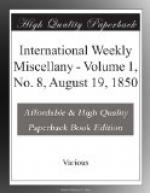* * * * *
M. LEVERRIER, the astronomer, has published a long and able argument in support of the free and universal use of the electric telegraph. He has supplied a most instructive and interesting exposition of the employment and utility of the invention, in all the countries in which it has been established. The American and the several European tariffs of charge are appended. He explains the different systems, scientific and practical, in detail, and gives the process and proceeds. He observes that the practicability of laying the wires under ground along all the great roads of France, which will protect them from accidents and mischief, will yield immense advantage to the Government and to individuals. He appears to prefer Bain’s Telegraph, for communication, to any other, and minutely traces and develops its mechanism. A bill before the French chambers, which he advocates, opens to the public the use of the telegraph, but with various restrictions calculated to prevent revolutionary or seditious abuses; to prevent illicit speculations in the public funds, and other bad purposes to which a free conveyance might be applied. The director of the telegraph is to be empowered to refuse to transmit what he shall deem repugnant to public order and good morals, and the government to suspend at will all private correspondence, on one or many lines.
* * * * *
THE WORKS OF REV. LEONARD WOODS, D.D., lately Professor of Theology in the Congregational Seminary of Andover, are in course of publication, and the third and fourth volumes have just appeared, completing the theological lectures of the venerable Professor, making in all one hundred and twenty-eight. In these, the student is furnished with a complete body of divinity as generally received by the orthodox denominations in New England, and has presented in a clear, condensed manner, the matured results of a long life of thought and study devoted to these subjects.




